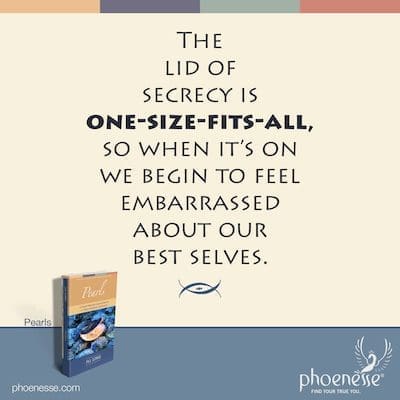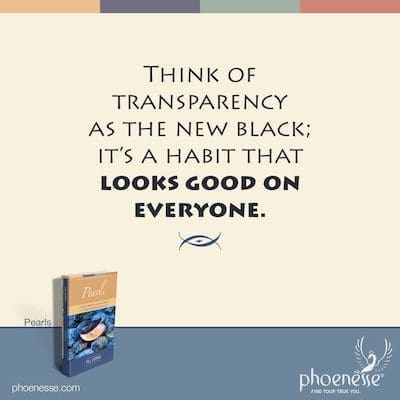Much as we may struggle to admit it, we all have needs: real, legitimate, have-a-right-to-have-them needs. One of these needs is for intimacy, for closeness. Another need is to have privacy. It’s not hard to imagine that these two can be tricky to weave together. The problem lies in our confusion between privacy and secrecy. Because when the two concepts of privacy and secrecy get cross-wired, closeness and intimacy become impossible.

The lid of secrecy is one-size-fits-all, so when it’s on we begin to feel embarrassed about our best ourselves.
Privacy, then, is not a nice-to-have, but a need-to-have. We need to have some time to be by and with ourselves, to dive into the depths of our interior, without disruption. Beyond this, sometimes we need some space to allow something we essentially desire to share with our loved ones to ripen. This is true whether it’s an artistic creation or a new insight or awareness. Some things just need a chance to complete itself before we open it up to others. Hence, having some privacy is a legitimate soul need.
The periods of privacy we’re talking about here are not the same as isolating or staying separate. In this case, a state of aloneness is a necessary means for finding more of ourselves. But of course, we all have a tendency to distort any divine quality into its negative counterpart. And that’s what happens when we seek privacy in order to avoid the anxiety created by contact.
Sometimes, we completely miss this point that we have a need for some privacy. Being oblivious to this reality, we may find ourselves alone—perhaps through circumstances beyond our control—and then immediately set about cluttering up our inner landscape with noise. Surface thoughts, loud music, perpetual input—all these effectively avoid the deep inner contact our souls are craving.
This can be one reason people gravitate to living in crowded conditions. They’re producing an outer reason to avoid inner aloneness. Other people living in such conditions may manage to be happy, despite the busyness that surrounds them.
Oddly, when people keep to themselves out of fear of contact with others, they are really primarily afraid of themselves. In fact, fear of self is our primary fear, followed by a fear of contact with others. Then being alone won’t satisfy the need for privacy. For in such cases, we don’t come any closer to knowing or liking ourselves. Likewise, we then won’t forge true intimacy or contact with others when we take the opportunity to spend time with them.

Where does secrecy come in? First, let’s be clear that the kind of secret we’re talking about here is different from when we keep a lovely surprise under wraps. In that case, we’re planning all along to joyfully reveal the “secret.” No, real secrets are never good because they are always hiding something negative. Otherwise, they wouldn’t be kept secret. The most surprising thing about secrets is the way we like to overlook this important fact.
Take apart any secret and we’ll find the wish to hide something that we think will be unpalatable to someone. Either we want to keep something in hiding ourselves, or someone else wants us to help them keep something destructive hidden.
If we would reveal our secrets, we could deal with them. We could dissolve them and replace them with beautiful, positive creations. But when we keep things secret, we incubate our negative thoughts, nurture dishonest behaviors and sustain destructive ways of behaving.
And it’s not like we don’t know what we’re doing. We’re perfectly well aware of our charades. Otherwise, once again, we wouldn’t be keeping them a secret. To cover this up, we may become self-righteous about our behavior. That’s about the time we claim our “need for privacy,” using it as a camouflage for our real intention, which is to keep things covered up in secrets.
This is what secretive people do. And that’s how the forces of darkness make their way into our lives. They count on our confusion and will hand us a truth we can use to cover up a lie. They’re good at what they do, and too often, we fall for it.

Nothing that is true and beautiful ever needs to be kept a secret. Not ever. Something that is divinely inspired will ripen in privacy and then unfold when the time is right—it’s never meant to be kept hidden. Secrets, on the other hand, are just the opposite, where we feel a need to hide our lies, dishonesty and destructiveness from others.
We may rationalize our secrets by saying, “If I reveal myself, I won’t be understood,” or “People will criticize me unfairly.” But is that really true? Because honestly, when we’re in truth, we won’t let possible misunderstandings from others justify the erection of impenetrable walls of secrecy. No, when we’re standing in truth—or attempting to get to the bottom of it—we’ll make an effort to help others understand. Further, we can use their pushback or criticism as an excavating tool to dig more deeply into the reality of a situation we might otherwise keep secret.
What’s happening when we keep secrets is that we fear we’re not in truth. Better yet, we often know we’re not, but we have no intention of changing. So then we’re really being dishonest, since we know that others wouldn’t react kindly to seeing what is hidden. And that’s what we are trying to avoid. We want their love and respect, but we suspect we won’t be able to earn it if they see what we’re hiding.
In the final analysis then, keeping secrets is like theft. We’re cheating as a way to secure a result that won’t come if we disclose our secret. We also like the way it keeps things lopsided. We don’t have to work at finding equitable, honest solutions that allow others to connect with us.
That’s how secrets destroy relationships. And that’s why secretive people don’t feel emotionally fulfilled. We build walls of separation that we cover over with secrets. Then we wonder why we feel alone and so very misunderstood. We need to put two and two together.
Often, we make things worse by blaming others for the state we’re in: “I’m so worried about their reaction, I have to keep things secret. It’s their fault.” Few things justify bad behavior like blame.
It doesn’t occur to us to spill out all our secrets and make ourselves transparent. And of course, this isn’t a quick or an easy thing to do. We need to bring all the patience, discernment and goodwill we can muster to this task.
Sometimes we’re just afraid of exposing ourselves. Fear whispers in our ear, “If they see the real me, they won’t love me.” Such reasoning has one little problem: it ignores the facts. To begin with, we might be assuming that love, respect and approval from others outweighs the importance of our own. This is simply not true.
What’s more, we may fail to see how the courage and honesty required for transparency—no matter what shameful things we’re sitting with and needing to reveal—create way more self-esteem than secretiveness ever could. And if we start to love ourselves, love from others will follow.

When we follow a spiritual path, we are on a direct mission to eliminate all our secrets. Our first step is to stop hiding things from ourselves. We keep our conscious minds in the dark, a lot. We need to realize just how much material we’re ignoring. We tuck it away in our unconscious, and there, it breeds and multiplies.
Once we start to develop a habit of being more honest with ourselves, we’ll naturally begin to drop the veils between ourselves and others. If we continue in this way, we’ll find it’s the only way to be. It’s the way to fulfill our need for contact and to live without fear and anxiety hanging over our heads. The relief of living without shame and hiding, without pretenses and façades is far more fulfilling than any savory secret.
When we find ourselves sitting with suspicious opinions or accusations about someone, we need to pause and notice how we want to secretly nurse them. Worse yet, we often like to share them with someone who will hold our secret with us. We need to bring all this into the open.
Doing so shows that our desire to be in truth exceeds our negative thoughts. It will become an organic process on our spiritual path to always search for the particular truth of any situation. And this will always bring us peace—if, that is, we are committed to real, unifying truth above all else.
Wanting to keep our secrets alive, however, clearly indicates that we are not yet committed to the truth. This includes the truth that we like maintaining this kind of negativity. On top of this, we want to continue. We do this precisely because we already know we’re not in truth and we don’t want to admit this.
And don’t be fooled by those making loud, public accusations of others as though this is an indication of their openness. Such displays may merely be acts of hostility and aggression covering up a motive to still keep their negative opinions secret.

Think of transparency as the new black; it’s a habit that looks good on everyone.
It’s important to realize that when we hold negative things in secret, we also keep a lid on revealing the best in ourselves. For the lid of secrecy is one-size-fits-all. When it’s on, we begin to feel embarrassed about our best ourselves. Our dreams and innermost desires will feel shameful.
The belief that there is anything to hide creates a fog that eventually covers up our greatness. Inherently positive aspects become shrouded in negativity whenever we are clinging to secrecy. We may discover, once the fog lifts, that our talents and gifts are part of what is being hidden. Until then, they may feel worthless simply because they are being hidden.
As we make our way along our spiritual path—regardless of which path we’re on—we need to gather the courage to expose everything we’ve been hiding. We will never regret making this step. It will usher in the freedom of no longer pretending in any way. And the clarity that comes from this will bring us straight to self-esteem. That, after all, is what we were hoping to get through our hiding.
The real way to reveal ourselves is by following the will of God. Then we need to let go of the results. Our revealing doesn’t depend on how others will react.
It’s possible we’ll find at first that our self-revealing brings on criticism and censure, more so than love and understanding. So we need to practice. Because, somehow, we may have revealed ourselves in a distorted way. We can also let our revealing mirror our destructive patterns back to us. The reaction from others can give us valuable information for reconsidering those same aspects in ourselves, now that we can see them more clearly.
The false way to go about self-revealing is to childishly say, in the skewed way of the Lower Self: “If I share my secrets with you, no matter how destructive they may be, I demand you approve of me. If you don’t, I’ll accuse you of letting me down. And I will use this as proof that it doesn’t pay to be transparent.” We need to be careful about giving ourselves credit for opening up if we’re going to do it in such a way. We want to make sure we sincerely desire to be in truth and in alignment with God’s will.
But isn’t it possible that others will leverage our openness as a way to violate our privacy? Indeed, others may try to pry into our personal business based on their own negative motives. They are hoping to uncover something they can use against us to make themselves feel better. People do this in a desperate attempt to prop up their own flagging self-esteem.
When we sense this is happening, we need to call on our own discernment and tend to our boundaries. The tricky part is to distinguish actual prying from genuine concern. This is especially hard to do when we’re still in the business of keeping our own secrets. For as long as we have a stake in hiding, our perceptions will be shaky, at best.
Think of transparency as the new black; it’s a habit that looks good on everyone. But we’ll need some patience and perseverance to wear it well. And we’ll need to devote ourselves to learning this fine art.
We’re going to be hesitant at first. But our inhibitions will evaporate the more we learn to express ourselves, conveying what at first we didn’t think we could ever get across. It’s like trying to tell someone a dream. At first it seems almost impossible. As we get rolling, we find we can explain it quite adequately.
When left inside the edges of our minds, our own thoughts and feelings seem so vague. We think they are so unexplainable we don’t attempt to convey them. But once we gain some confidence that we can articulate our experience—even if we can’t capture every little nuance—we’ll be surprised at how well we can make ourselves known. If we’re willing to open up, we can reach others who may have the same inner experience. And in that way, we can connect emotionally more quickly than we ever suspected.
The point is, communication is essential to self-revealing. If we want to be open, effort will be required. But the rewards are fantastic. Whatever appeared embarrassing only seemed so because we didn’t believe we could find the proper words. If we try, the words will come.
Discovering a new and wonderful way of expressing ourselves boosts our sense of adequacy. If we sincerely want to reveal ourselves, we need to open up our willingness to let God inspire us. Then the appropriate words will flow and the walls we have built around ourselves will disappear.

Living in complete openness is the goal for any relationship: intimate partnerships, friendships, business colleagues, and even relationships between countries. For the new man and new woman who enter into a more evolved way of being in relationship, they will no longer keep secrets. Such behavior is simply not compatible with the newly emerging way of consciously relating.
Secrets will feel like the unbearably heavy burden they are. In fact, the more our consciousness is infused with the Christ spirit, the more quickly we will want to dissolve such a burden, in the most productive and creative way possible.
In addition to the outer secrets, we need to be on the lookout for the more subtle inner ones. This means we need to be willing to take a risk to lay everything on the table. Without this, the bliss of relationship can’t materialize anyway.
The problem is our false belief that we’re not good enough. We have to keep challenging this, over and over, every time it surfaces. Each time, we can take a little more risk, until everything is out in the open. Then ongoing communication can be established.
Like an engine in which gunk builds up over time, we’re going to find some residual sludge in our inner pipes. Once we clear this out though, making all of ourselves known, a new process will automatically take over.
Our souls are not fixed, static things. We’re constantly changing and moving, producing new inner vistas and visions. With clean inner pipes, we’ll be in good shape to share what emerges with our loved one. Such transparency then is our path to utter joy.
When it comes to our friendships, we don’t do them justice if we feel there is anything we must keep hidden. For then we’ll never know if we are loved and accepted. If we fail to take the risk of showing our friends all that we are—all that we have kept hidden—we’ll remain in fear and distrust.
We need to become willing to look at our Lower Self goals, which are always primarily to keep us in separation. We can trust that our Higher Self aim for connection will carry us through. If trust is what we lack, we can start by sharing that.
Even the interactions between countries are often enormously impacted by secretiveness. To be sure, there is more hiding and pretense there than in any other relationship. Openness is often simply not considered a viable option for governments of different countries. Opaqueness, we believe, makes for sound diplomacy.
In this area, humanity has fallen far off the pace of where we could and should be, although other areas also leave something to be desired. Consider how people in a marriage often keep secrets, not just about the past but also about present-day thoughts and feelings. Look at how this correlates with the failure of so many marriages.
Yet most marriages are better off than the interrelationships between countries. For these are often mired in distrust, strife and deceit. We need a whole new plan if we’re hoping for peace to break out around the world. Then we will be able to share God’s riches. Otherwise, justice and brotherhood will remain empty words.
So just as individuals need to go through the painstaking process of learning to be open, so must countries. But what’s the alternative? We can’t get to peace and harmony any other way. It’s like trying to live life while projecting a false version of ourselves, basically saying, “Please see me only as I pretend to be.” It’s going to be hard to forge an authentic, trusting connection on top of that.

Can you visualize a world in which no one ever hides anything from anyone, ever? What stops us is 1) Our fear of risking rejection if the other saw our Real Self. For we are secretly terrified that our Lower Self makes us all bad, 2) Our unfamiliarity with how to communicate so we are understood. We must be willing to learn to do this, step by step, and 3) Our fear of being invulnerable if all our hard shells fall off. Secrets are among the hardest layers surrounding our souls.
What’s the common denominator among these three factors? Our resistance to going to God with all of ourselves and trusting his will. Instead, we let the dark forces manipulate us and inspire us to trust in whatever keeps us separate. We mistakenly think that’s code for “safe.”
We’ve got to wake up and see that this is no way to live. We desperately need to start challenging this logic. We have to choose new behaviors and seek new solutions.
A few final thoughts about the third factor: vulnerability. There’s more to this than feeling less protected without our secrets. This is, in fact, an out-and-out illusion. And it’s actually an easy one to spot, once we find the courage to face ourselves. But there’s also another kind of vulnerability.
We’re going to find that as we open up, new capacities for perception will grow in us. We’ll experience clarity about many areas of life that were vague and murky before. If we’re not looking for this though, we’ll miss it. Because too much fog and darkness still cling to the edges of our current reality.
Here’s something else to consider: Our emerging sense of vulnerability may bring with it a grieving pain regarding the destruction that results from evil in our midst. It’s OK to let this develop—to experience this fully—however it manifests. It’s actually a healthy pain that arises when we see God’s gifts squandered. When we see, for example, nature being willfully destroyed.
We may feel this pain about the suffering of animals who, as part of fulfilling their function in the greater life cycle, become prey for other animals. Certainly, this is much less hurtful than the suffering inflicted on animals by indifferent or cruel humans. But nonetheless, it is painful that animals must go through this phase in their own evolution, even as there is an intrinsic rightness about this. These animals are aspects of consciousness which have incarnated to have these experiences. But there is an innocence there that causes us to feel pain for them.
Why must we open to feeling this kind of pain that arises from our compassion and gratitude for the beauty of creation? Because this soft pain—which is so different from our neurotic, self-punishing pain of victimhood—is a threshold to feeling joy and ecstasy.
It’s by opening to this pain that we recognize that untrue thoughts about any of our fellow humans are as damaging to ourselves as they are to others. When we malign others or hold onto unwarranted suspicions, we impose unfair disadvantages on them. We make them our prey.
As long as we deny this pain, we pay a higher and higher price. For this pain must eventually turn against whoever is inflicting it. It also turns against whoever colludes with others by passively standing by. We have to let ourselves know and feel this pain instead of blindly following the dark forces and pretending we don’t see the pain we cause another.
For when we do that, debilitating guilt is sure to follow us. And then self-punishment builds on that. Our compassion and willingness to simply see the pain that exists in this world will make us whole again.
Return to Pearls Contents


